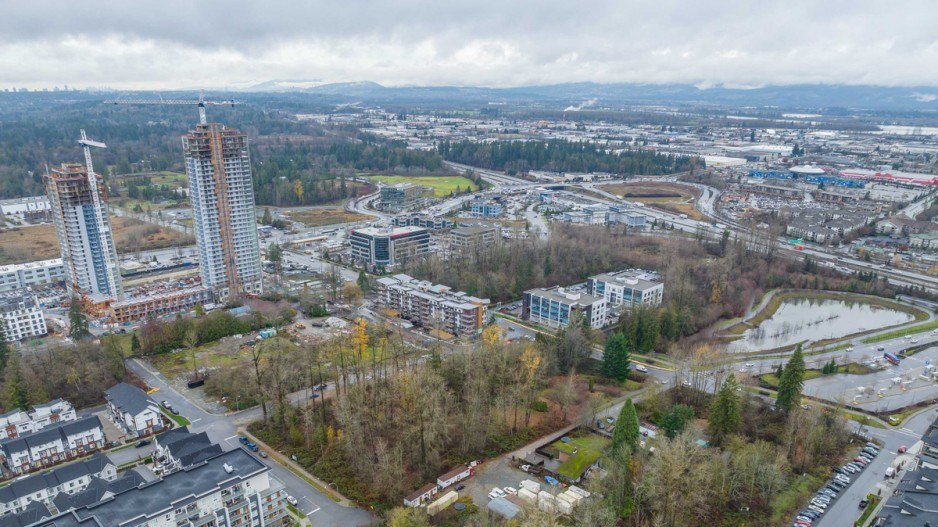The city and township of Langley are gearing up for increased density as they look to build out the areas around transit nodes.
New government legislation and local initiatives are calling for more development in areas like the Carvolth Transit Exchange, the 200 Street corridor and the Surrey Langley SkyTrain expansion of the Expo Line.
The project will create “a ton of opportunity,” say industry experts, but the holding cost of land, cost of construction, decreased revenue on the end product due to interest rates and municipal fees, taxes and levies are proving tough to stomach.
“Development in Langley, Surrey and in the suburbs has shifted a lot more from ground orientation, that being single family and townhomes, to multifamily condo and highrises,” said Justin Mitchell, founding partner and associate broker at Frontline Real Estate Services Ltd.
Carvolth Transit Exchange, a bus transfer point in northwestern Langley township, is seeing increased development activity. Frontline describes it as the “centre of growth in Willoughby.”
Frontline is acting as the broker for the sale of a 1.9-hectare site opposite the exchange, which is set to deliver 223 apartment units across two six-storey buildings. The site owners have achieved a third reading on their application for the proposed development.
Other examples of developments in the area are the Xchange, an office development by Infinity Properties Ltd., and a mixed-use development consisting of three buildings by Isle of Mann Property Group.
The bus exchange was included in the 10-year priorities of Metro 2050 as a Frequent Transit Development Area, with a rapid bus route planned from Carvolth to Scott Road station.
Carvolth is also connected to the 200 Street corridor, an area identified as having a lot of development opportunity due to the 200 Street 2040 plan that follows the push for higher density by township Mayor Eric Woodward.
Much of this area has been acquired by developers and investors, however “opportunity remains in this area for redevelopment,” said Megan Johal, a commercial real estate broker with the development land division at Frontline.
“It's easy to say, if you drive past it on the street, ‘Oh, it's available because there's nothing happening and it all looks like a big green field.’ … Although it's undeveloped, it's very, very busy,” she said.
The corridor encompasses 800 metres on either side of 200 Street, stretching from the Trans-Canada Highway south to 68 Avenue, according to the Township of Langley.
Mitchell and Johal said that an “interesting evolution” has taken place in the area since the local push for densification, coupled with new government legislation on transit-oriented development.
While higher density projects are an opportunity, government fees, higher material costs, the extended construction timeline and greater exposure to a changing market makes them riskier to undertake.
“A number of developers have acquired sites assuming that they would be a townhouse site, and now their townhouse site is being re-designated for condo,” said Mitchell. “The challenge is that the fees and costs associated with the increased density may make some projects not economically viable in this market.”
For this reason, Mitchell and Johal predict that some developers may move forward with projects at lower density than the maximum allowed.
“Today, it's difficult to make some of the numbers work on some development lands with higher density,” said Joe Varing, director of sales with Varing Marketing Group.
When local development cost charges and Metro Vancouver fees are combined, condo development costs increase 74 per cent, townhomes by 75 per cent and single-family developments see doubling in fees, according to Frontline.
Unique challenges to build in Langley city will come in the form of poor soil conditions due to a high water table and “a lot of assembly required” thanks to the smaller lots, according to Johal and Mitchell.
“We'll potentially see some developers and investors reselling their sites to other groups that are more geared towards higher density developments. That'll certainly be a trend that we see in Langley, whether it's in the 200 Street corridor, near the Carvolth Transit Exchange or in Langley city,” said Mitchell.
Editors note: This story was updated to reflect that Frontline is acting as the broker on the sale of the 1.9-hectare across from Carvolth Transit Exchange and are not the site owners.




